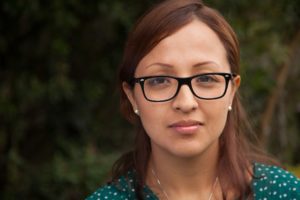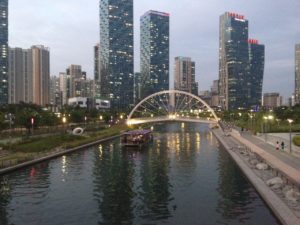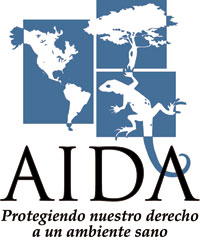Scroll down for French and Spanish


The Green Climate Fund is moving closer to financing its first projects and programs. If things are done the right way it could contribute effectively to global efforts to counter climate change, but first transparency in the decision making process needs to be guaranteed.
In July, the tenth meeting of the Green Climate Fund management board was held in Songdo, Korean Republic. Important steps were taken towards the implementation of the institution. However, moments of great tension were also experienced, especially during the accreditation process of new entities by the Fund.
The management board decided to grant accreditation to a batch of 13 new national, regional and international entities. And they did this although civil society asked them not to choose this adoption method as it doesn’t allow the board to review each application thoroughly nor does it allow the accreditation review panel to question the decision to recommend entities. Observers warned that if this process were to be followed, the Fund’s reputation would be at risk.
Since the board’s ninth meeting the decision making process used to grant accreditation to new entities has lacked transparency. The applicants’ names aren’t revealed until the board has granted them accreditation. This makes it difficult for the observers to give inputs on the applications. Furthermore, the information on the entities’ track records comes from the entities themselves and not from a third party, so it lacks objectivity.
Similarly, the majority of recommended entities applied for accreditation by the Fund for class A programs and projects, which are considered as high risk projects in that they can cause irreversible and negative social and environmental impacts.
On the other hand, the Fund claimed that the applications are accepted on a first-come first-serve basis. In this regard, they are not selected in such a way to ensure a balance in the kind of entities, their nature and their risk management capacity.
Accepting applications on a first-come first-serve basis is not the best way for an institution which aims not only at fighting climate change but also at fostering sustainable development and achieving co-benefits in the implementation of the programs and projects financed.

Since the board’s ninth meeting the decision making process used to grant accreditation to new entities has lacked transparency.
The accreditation was only one of the issues on the table of the meeting in Songdo but it was very important since the entities accredited will be the channel through which developing countries submit their programs and projects propositions in order to receive financial support from the Fund.
With 20 entities accredited until now the Green Fund is moving closer to starting its operations. Its goal is to demonstrate that it is different from other existing entities and that its operations can promote climate-resilient sustainable development while reducing emissions. A set of conditions must still be guaranteed to ensure successful operations.
The next board meeting will be held in Zambia from 4 to 6 November, right before COP21. We hope that the board will approve the funding of the first projects and programs propositions.
By Andrea Rodriguez Osuna, Senior lawyer of the Climate Change Program of the Interamerican Association for Environmental Defense (AIDA)


Created in 1998, AIDA is an international non-profit organization which uses the law to protect the environment on the American continent.
Click here if you want to read the other articles of our Watch This! Newsletter



Le Fonds vert pour le climat s’apprête peu à peu à financer ses premiers projets et programmes. Ce financement permettrait de contribuer efficacement aux efforts globaux mis en place pour combattre le réchauffement climatique, mais avant cela, il convient de garantir la transparence des processus décisionnels.
En juillet dernier eut lieu à Songdo, en République de Corée, la dixième réunion du conseil d’administration du Fonds vert pour le climat. Les participants ont pris des mesures authentiquement favorables à la mise en place de l’institution. Toutefois, il y eut des moments de grande tension, surtout au cours du processus d’accréditation de nouvelles entités devant le Fonds.
Le conseil d’administration a décidé d’agréer 13 nouvelles entités nationales, régionales et internationales, et ce malgré la demande de la part de la société civile de ne pas opter pour cette forme d’approbation, qui ne permet pas que le conseil examine chaque candidature de façon approfondie, ni que le groupe d’accréditation ne remette en question la décision de recommander certaines entités. Les observateurs ont prévenu que ce processus, s’il était suivi, pourrait mettre en péril la réputation du Fonds.
Depuis la neuvième réunion du conseil, le processus décisionnel d’accréditation de nouvelles entités manque de transparence. Les noms des candidats ne sont révélés qu’à leur accréditation par le conseil. Ceci complique la tâche des observateurs de remettre un avis sur les candidatures. Par ailleurs, les informations relatives au bilan des entités viennent des entités-mêmes et non de tiers, ce qui en fait des informations non-objectives.
De plus, la majeure partie des entités recommandées demandaient l’accréditation du Fonds pour des programmes et projets de catégorie A, à savoir des projets à hauts risques, en ce sens qu’ils pourraient avoir un impact social et environnemental négatif irréversible.
D’un autre côté, le Fonds a fait savoir que les candidatures étaient traitées dans leur ordre de soumission. Elles ne sont donc pas sélectionnées de manière à maintenir un équilibre entre le type, la nature et la capacité des entités à gérer les risques.
Accepter les candidatures dans l’ordre n’est pas optimal pour une institution qui cherche non seulement à lutter contre le réchauffement climatique, mais aussi à promouvoir le développement durable et à contribuer à obtenir des avantages connexes à l’exécution des programmes et des projets financés.
Bien que l’accréditation n’ait été qu’un point parmi d’autre de la réunion, il revêt une grande importance. En effet, les entités accréditées seront la voie par laquelle les pays en développement présenteront leurs propositions de programmes et projets pour obtenir des ressources financières de la part du Fonds.
Avec 20 entités accréditées jusqu’à présent, le Fonds vert est toujours plus près de devenir opérationnel. Son objectif est de démontrer qu’il diffère des entités existantes et que ses opérations permettront de promouvoir un développement durable, faible en émissions et à l’épreuve des changements climatiques. Il reste à garantir une série de conditions clé pour assurer la réussite de son fonctionnement.
La prochaine réunion du conseil d’administration se tiendra en Zambie, du 4 au 6 novembre, juste avant la COP21. Nous espérons que le conseil y approuvera le financement des premières propositions de projets et de programmes.
Par Andrea Rodriguez Osuna, Juriste senior du Programme « changement climatique » de Association interaméricaine pour la défense de l’environnement (AIDA)


Fondée en 1998, AIDA est une organisation internationale sans but lucratif qui recourt à la loi pour protéger l’environnement sur le continent américain.
Cliquez ici si vous voulez lire les autres articles de notre Lettre d’Information Watch This!



El Fondo Verde del Clima está cada vez más cerca de financiar sus primeros proyectos y programas. De hacerlo bien, podría contribuir efectivamente a los esfuerzos globales para combatir el cambio climático, pero antes debe garantizar transparencia en sus procesos de toma de decisiones.
El pasado mes de julio, en Songo, República de Corea, tuvo lugar la décima reunión de la Junta Directiva del Fondo Verde del Clima. En la cita se lograron una serie de avances importantes hacia la puesta en marcha de la institución. No obstante, también hubieron momentos de gran tensión, particularmente durante el proceso de acreditación de nuevas entidades ante el Fondo.
La Junta Directiva decidió acreditar en paquete a 13 nuevas entidades nacionales, regionales e internacionales. Lo hizo pese a la solicitud de la sociedad civil de no optar por esa modalidad de aprobación, la cual no permite una revisión detallada de cada aplicación por parte de la Junta, ni admite cuestionar la decisión de recomendar entidades por parte del Panel de Acreditación. Los observadores advirtieron que seguir ese procedimiento pondría en riesgo la reputación del Fondo.
Desde la novena reunión de la Junta, el proceso de toma de decisiones para acreditar a nuevas entidades ha carecido de transparencia. Los nombres de los aplicantes no son revelados sino hasta que la Junta los acredita. Ello dificulta que los observadores den insumos sobre las postulaciones. Además, la información relativa a la trayectoria demostrada de las entidades proviene de una autoaplicación y no de terceros, lo cual hace que la información no sea objetiva.
Asimismo, la mayoría de las entidades recomendadas buscaba acreditación ante el Fondo para programas y proyectos de categoría A, aquellos considerados de alto riesgo porque pueden ocasionar posibles impactos sociales y ambientales irreversibles.
Por otro lado, el Fondo ha manifestado que las solicitudes son aceptadas por orden de llegada. En ese sentido, no son seleccionadas de forma que se asegure un equilibrio en el tipo de entidades, su naturaleza y su capacidad referente al manejo de riesgo.
Aceptar solicitudes por orden de llegada, no es lo más óptimo para una institución que busca no sólo combatir el cambio climático, sino también promover el desarrollo sostenible y contribuir a la obtención de cobeneficios en la implementación de los programas y proyectos financiados.
Si bien la acreditación fue uno de los varios puntos abordados durante la reunión en Songdo, se trata de una decisión de gran importancia ya que las entidades acreditadas serán el canal mediante el cual los países en desarrollo presentarán sus propuestas de programas y proyectos para obtener recursos financieros del Fondo.
Con 20 entidades acreditadas al momento, el Fondo Verde está cada vez más cerca de empezar a operar. Su reto entonces es demostrar que es una entidad diferente a las existentes y que sus operaciones promoverán un desarrollo sostenible, bajo en emisiones y resiliente al clima. Aún debe garantizar una serie de condiciones clave para que su funcionamiento sea exitoso.
La próxima reunión de la Junta Directiva se llevará a cabo en Zambia, del 4 al 6 de noviembre, justo antes de la COP21. Se espera que en ella la Junta apruebe las primeras propuestas de proyectos y programas a ser financiados.
Escrito por Andrea Rodriguez Osuna, Abogada Sénior del Programa de Cambio Climático de la Asociación Interamericana para la Defensa del Ambiente (AIDA)


Fundada en 1998, AIDA es una organización internacional sin fines de lucro que usa la ley para proteger el ambiente en el continente americano.
Haz clic aquí para leer los otros artículos del nuestro Boletín Watch This!






